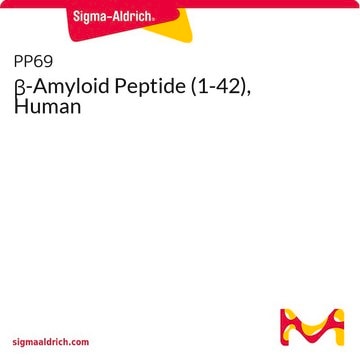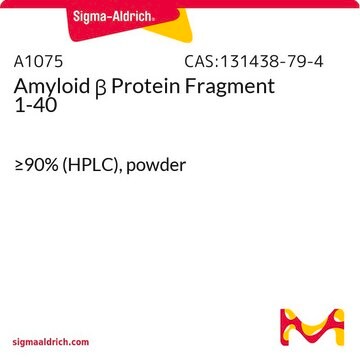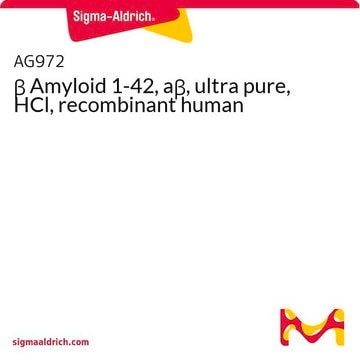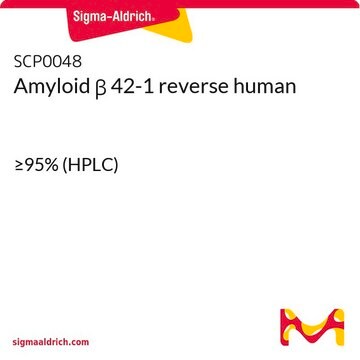This material has a molecular weight of 4514.2 Daltons and may be resuspended at 1 mg/mL in 1% NH4OH with sonication for 30 seconds to 1 minute. After resuspension, add 5x or 10x buffer stock (PBS, TBS) and water to bring the concentration to 1x.
AG968
β Amyloid 1-42, aβ, ultra pure, HFIP, recombinant human
About This Item
Empfohlene Produkte
Biologische Quelle
human
Qualitätsniveau
Assay
>97.0%
Form
powder
Hersteller/Markenname
Chemicon®
NCBI-Hinterlegungsnummer
UniProt-Hinterlegungsnummer
Angaben zum Gen
human ... APP(351)
Allgemeine Beschreibung
Anwendung
- to study its effect on the activity of mitochondrial BKCa (mitoBKCa) channels in human astrocytoma cells through patch-clamp technique
- to study its effect on alteration in protein levels of dystrophic neurites (DNs) forming proteins in mouse neuroblastoma cells
- to induce Alzheimer′s disease in a rat model for experimental studies
Biochem./physiol. Wirkung
Rechtliche Hinweise
Lagerklassenschlüssel
13 - Non Combustible Solids
WGK
WGK 1
Flammpunkt (°F)
Not applicable
Flammpunkt (°C)
Not applicable
Analysenzertifikate (COA)
Suchen Sie nach Analysenzertifikate (COA), indem Sie die Lot-/Chargennummer des Produkts eingeben. Lot- und Chargennummern sind auf dem Produktetikett hinter den Wörtern ‘Lot’ oder ‘Batch’ (Lot oder Charge) zu finden.
Besitzen Sie dieses Produkt bereits?
In der Dokumentenbibliothek finden Sie die Dokumentation zu den Produkten, die Sie kürzlich erworben haben.
Kunden haben sich ebenfalls angesehen
-
What's the molecular weight and solubility of β Amyloid 1-42 (AG968)?
1 answer-
Helpful?
-
Active Filters
Unser Team von Wissenschaftlern verfügt über Erfahrung in allen Forschungsbereichen einschließlich Life Science, Materialwissenschaften, chemischer Synthese, Chromatographie, Analytik und vielen mehr..
Setzen Sie sich mit dem technischen Dienst in Verbindung.










